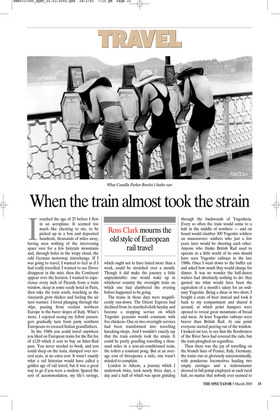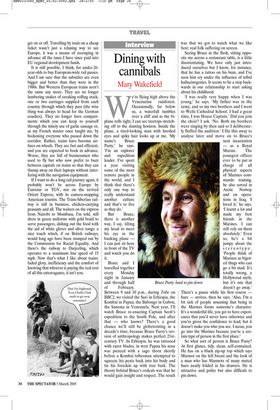When the train almost took the strain
Ross Clark mourns the old style of European rail travel
Ireached the age of 25 before I flew in an aeroplane. It seemed too much like cheating to me, to be picked up in a box and deposited hundreds, thousands of miles away, having seen nothing of the intervening space save for a few fairytale mountains and, through holes in the wispy cloud, the odd German motorway interchange. If I was going to travel, I wanted to feel as if I had really travelled. I wanted to see Dover disappear in the mist, then the Continent appear over the horizon. I wanted to experience every inch of Picardy from a train window, sleep in some seedy hotel in Paris, then take the train south, watching as the vineyards grow thicker and feeling the air turn warmer. I loved plunging through the Alps, passing from verdant northern Europe to the barer slopes of Italy. What’s more, I enjoyed seeing my fellow passengers gradually turn from pasty northern Europeans to creased Italian grandfathers.
In the 1980s you could travel anywhere you liked on European trains for the flat fee of £120 which it cost to buy an Inter-Rail pass. You never needed to book, and you could sleep on the train, slumped over several seats, at no extra cost. It wasn’t exactly what a rail historian would have called a golden age of rail travel, but it was a great way to go if you were a student. Spared the cost of accommodation, my life’s savings, which ought not to have lasted more than a week, could be stretched over a month. Though it did make the journey a little unpredictable: one would wake up in whichever country the overnight train on which one had clambered the evening before happened to be going.
The trains in those days were magnificently run-down. The Orient Express had declined from its starched-cloth heyday and become a stopping service on which Yugoslav peasants would commute with live chickens. One or two overnight services had been transformed into travelling knocking-shops. And I wouldn’t exactly say that the train entirely took the strain. It could be pretty gruelling travelling a thousand miles in a non-air-conditioned train, the toilets a constant pong. But at an average cost of threepence a mile, one wasn’t minded to complain.
London to Athens, a journey which I undertook twice, took nearly three days, a day and a half of which was spent grinding through the backwoods of Yugoslavia. Every so often the train would come to a halt in the middle of nowhere — and on board would clamber 300 Yugoslav soldiers on manoeuvres: soldiers who just a few years later would be shooting each other. Anyone who thinks British Rail used to operate in a little world of its own should have seen Yugoslav railways in the late 1980s. Once I went down to the buffet car and asked how much they would charge for dinner. It was no wonder the half-dozen waiters had absolutely nothing to do: they quoted me what would have been the equivalent of a month’s salary for an ordinary Yugoslav. Being a dinar or two short, I bought a crate of beer instead and took it back to my compartment and shared it around, at which point hampers were opened to reveal great mountains of bread and meat. At least Yugoslav railways were braver than British Rail. At one point everyone started peering out of the window. I looked out too, to see that the floodwaters of the River Sava had covered the rails, but the train ploughed on regardless.
Then there was the joy of travelling on the branch lines of France, Italy, Germany, the trains run so gloriously uneconomically, with ponderous locomotives hauling two empty carriages and a stationmaster dressed in full pomp employed at each rural halt, no matter that nobody ever seemed to get on or off. Travelling by train on a cheap ticket wasn’t just a relaxing way to see Europe, it was a means of recouping in advance all the taxes I have since paid into EU regional development funds.
It is still possible, I think, for under-26year-olds to buy European-wide rail passes. And I am sure that the subsidies are even bigger and better than they were in the 1980s. But Western European trains aren’t the same any more. They are no longer lumbering snakes of creaking rolling stock, one or two carriages supplied from each country through which they pass (the wise thing was always to head for the German coaches). They no longer have compartments which you can keep to yourself through the timely use of garlic sausage or, as my French master once taught me, by beckoning everyone who passed down the corridor. Rather, trains have become airlines on wheels. They are fast and efficient, and you are expected to book in advance. Worse, they are full of businessmen who used to fly but who now prefer to buzz between capitals on trains so that they can thump away on their laptops without interfering with the navigation equipment.
If I want to do a long rail journey again, it probably won’t be across Europe by Eurostar or TGV, nor on the revived Orient Express, with its camera-snapping American tourists. The Trans-Siberian railway is still in business, chicken-carrying peasants and all. The waiters on the express from Nairobi to Mombasa, I’m told, still dress in green uniforms with gold braid to serve passengers, dishing out the food with the aid of white gloves and silver tongs: a nice touch which, if on British railways, would long ago have been stamped out by the Commission for Racial Equality. And there’s the railway to Darjeeling, which operates to a maximum line speed of 15 mph. Now that’s what I like about trains: faded glory, inefficiency and the comfort of knowing that whoever is paying the real cost of all this extravagance, it isn’t you.



























































 Previous page
Previous page